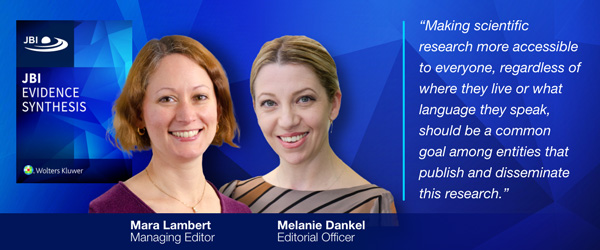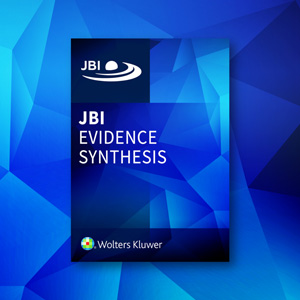Improving the accessibility of scientific research to promote equity
In order to achieve equity in global health, those who are involved in all aspects of the evidence ecosystem must be able to access high-quality, evidence-based research that meets the accepted standards of the scientific community. Making scientific research more accessible to everyone, regardless of where they live or what language they speak, should be a common goal among entities that publish and disseminate this research.
At JBI Evidence Synthesis, an official journal of JBI, we are proud of our global reach in promoting research to inform health care policy and practice. Since 2020, we have published papers by authors from 37 different countries, and over that same period, we have received valuable manuscript feedback from peer reviewers from nearly 70 countries. In fact, in 2023 alone, readers from more than 200 countries have accessed our content. Our editorial panel, including our editorial advisory board members and associate editors, comprises individuals from 14 countries. This diversity is important, as we strive to involve stakeholders from a variety of settings and communities, where local knowledge is critical to advancements in health outcomes.
Removing financial barriers to accessibility in LMICs
It is important that our content is accessible to clinicians, health care educators, and policymakers worldwide. This year’s World Evidence-Based Healthcare Day theme, ‘Evidence and Global Health Equity’, aligns with some recent and ongoing endeavours undertaken by JBI Evidence Synthesis as we seek to expand the reach of our authors’ work.
Some of our initiatives to advance global health equity involve making it easier for authors and readers in low- and middle-income countries (LMICs) to publish and access research. For example, when all members of an author team are located in an LMIC, article processing charges for the publication of a systematic or scoping review protocol in JBI Evidence Synthesis are waived. Also, there are no article processing charges for authors publishing a full systematic or scoping review in the journal, regardless of where they live. This removes an obstacle that may prevent some authors in low-resource settings from getting their work published.
In terms of accessibility for readers, all protocols published in JBI Evidence Synthesis are freely available to read. Full systematic and scoping reviews submitted by authors from the JBI Collaboration located in an LMIC are also free to read. This means that the work by these authors is available, not only to those in their own country, but also to readers around the world who rely on the findings of research conducted locally in these settings.

Addressing language barriers in the dissemination of scientific research
Language is another factor to consider in the dissemination of research. This year, JBI Evidence Synthesis piloted an initiative to improve access to content in countries where English is not the primary spoken language. Although English is considered the lingua franca of the scientific community, we recognise that there are many evidence ecosystems where knowledge users do not speak, read, or understand English. Yet, it is still crucial that we work toward equitable access to science in these communities.
As a small first step in acknowledging the importance of linguistic diversity, JBI Evidence Synthesis is excited to now offer authors with a proficiency in languages other than English (LOTE) the opportunity to submit a translation of their systematic or scoping review abstract. This initiative aims to make research more inclusive, improve equitable access, and better serve the diversity of JBI and our readership. To date, we have published abstracts in Japanese, Danish, Thai, and Arabic, among others.
While AI tools may seem like a convenient option, negating the need for translations by someone proficient in the language, AI tools lack the ability to contextualise meaning and to interpret nuance – skills that can be critical in the field of healthcare research. In this regard, we turn to the content experts who have a deep understanding of the breadth of the research topic.
Although still in its infancy, this project has been met with enthusiasm by authors and has received positive feedback in informal polls. We hope that more authors with proficiency in LOTE choose to participate by submitting a translated abstract to make it easier for readers to discover their research and, ideally, incorporate it into their own evidence ecosystem. We are pleased that the availability of these LOTE abstracts is visible in an article’s PubMed record, which also enables discoverability.
Partnering with authors and readers to promote equity
Achieving true equity in healthcare and healthcare research is still a challenge. We hope that the continued focus at JBI Evidence Synthesis on reducing the disparities between countries and communities will contribute, at least in a small way, to the promotion of evidence-based healthcare for all.
Authors
Mara Lambert and Melanie Dankel
JBI, Faculty of Health and Medical Sciences, The University of Adelaide, Adelaide, Australia
Disclosure: ML and MD are paid employees of JBI and work in the JBI Evidence Synthesis editorial office. No parts of this blog have been published elsewhere.
Disclaimer
The views expressed in this World EBHC Day Blog, as well as any errors or omissions, are the sole responsibility of the author and do not represent the views of the World EBHC Day Steering Committee, Official Partners or Sponsors; nor does it imply endorsement by the aforementioned parties.
